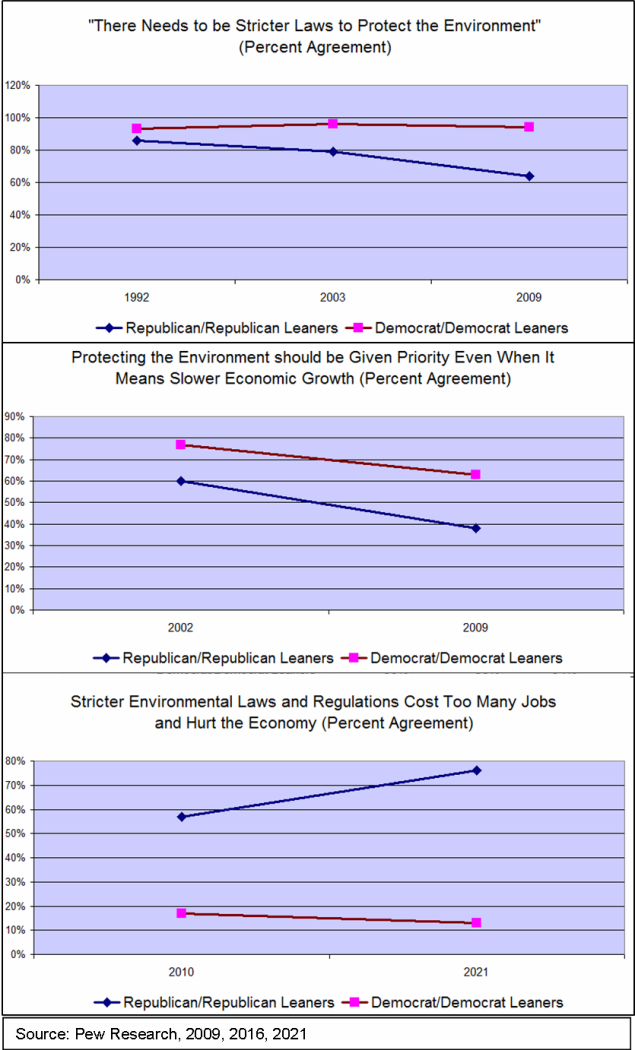Spot the Trend:
Takeaways: Republicans have become increasingly critical of the environmental movement over the last 30 years, while Democrat enthusiasm has remains undiminished, except for a brief dip in 2009-10, likely due to the trauma of the Great Recession. More recently, Democrat enthusiasm has rebounded, as has their tendency to downplay the economic cost of stricter environmental regulation.
Now, spot the pattern:
Takeaway: Republicans are of a mixed mind about environmental policy; Democrats, not so much. While it’s no surprise that Republicans are more sensitive than Democrats to the possible economic repercussions of government policies in general, they do seem relatively open to considering the merits of specific policies that aren’t perfectly aligned with their general concerns, e.g., banning oil drilling in a wildlife refuge. For more examples of this relative open-mindedness, see my 2020 post, Behind the Headline: Majorities of Republicans and Democrats Agree on Nearly 150 Issues.
As for why Republicans and Democrats have diverged so much on environmental regulation, I’ll close with an extended excerpt from my 2018 post, Environmental Politics:
“There was a time when Republicans embraced the cause of environmental protection. Think Progress noted that “some of the greatest conservationists ever to take the oath of office were Republicans.” Both Greenpeace and the Union of Concerned Scientists rated Richard Nixon one of the greenest president ever. And we're not talking ancient history here: both Presidents Bush supported cap and trade policies to reduce pollution.
So what happened? What happened is that the environmental movement was taken over by anti-business purists who essentially vilified their detractors as amoral worshipers of profit and consumption willing to destroy the natural world in relentless pursuit of the almighty dollar. [To illustrate…]
“If you are the Sierra Club, what would you call a senator who: a) voted against oil drilling in the Arctic National Wildlife Refuge; b) introduced legislation to cut greenhouse gas emissions; and c) co-wrote a 3.5 million-acre statewide wilderness bill? Answer: the enemy.” - - Joel Connelly, Seattle PI, “Sierra Club throws a sucker punch” March 2, 2008
“Civil disobedience is the response of ordinary people to extraordinary injustices,” the group said in a statement before the protest, casting the climate debate as akin to previous struggles over “slavery, child labor, suffrage, segregation and inequality for gays and immigrant workers.” - - Talia Buford, Politico, “Sierra Club goes Bolder” February 23, 2013
Here we have a message: if you don't agree with us, you're no different than an apologist for slavery and child labor. If you don't get with our program, there will be no future for our children.
Is it any wonder that a lot of Republicans soured on the environmental movement or came to doubt the "consensus" on climate change? Sure, as members of a pro-business/limited government party, it's not surprising that Republicans would be a bit less gung-ho about environmental regulation than Democrats. But that doesn't explain the change in Republican opinion over the last decade or so. …
Notice that the partisan divergence on environmental regulation [increases soon after] the Great Recession. It actually makes a lot of sense to me that people would be more concerned about the impact of regulations on jobs and the economy when the economy [has just tanked]. The fact that Democratic opinion didn't budge much in response to the economic tailspin and its prolonged aftermath must have reinforced Republican suspicions that Democrats/environmentalists are indifferent to the reality of their everyday lives.

